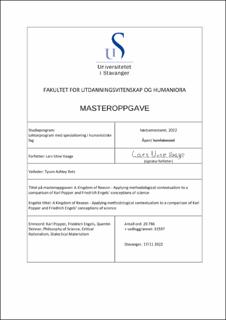| dc.contributor.advisor | Retz, Tyson | |
| dc.contributor.author | Vaage, Lars Utne | |
| dc.date.accessioned | 2023-01-06T16:51:15Z | |
| dc.date.available | 2023-01-06T16:51:15Z | |
| dc.date.issued | 2022 | |
| dc.identifier | no.uis:inspera:127060696:13410986 | |
| dc.identifier.uri | https://hdl.handle.net/11250/3041672 | |
| dc.description.abstract | Denne Masteroppgaven sammenlikner Karl Popper og Friedrich Engels sine vitenskapsfilosofier via Quentin Skinner’s metodologiske kontekstualisme.
Problemstillingen oppgaven forsøker å besvare er som følger:
«Hvilke likheter finnes det mellom Karl Popper og Friedrich Engels sine vitenskapsfilosofier?»
Analysen konkluderer med at deres vitenskapsfilosofier deler flere viktige og relativt lite anerkjente likheter, og at disse kan forstås i lys av metodologisk kontekstualisme. Oppgaven argumenterer for at begge tenkere ønsket å intervenere i kontemporær politisk diskurs via en gjennomgående vitenskapsfilosofisk kritikk av politiske og filosofiske retninger, i tillegg til å legge frem en alternativ politisk tenking basert på den samme vitenskapelige filosofien. Denne generelle likheten i intensjon og metode ledet dem til å utvikle likheter i deres oppfatning av vitenskapsfilosofi. På samme måte, den betydelige og grunnleggende forskjellen mellom dem argumenteres for å være delvis på grunn av deres forskjellige historiske kontekst og politiske mål.
Denne oppgavens relevans er et bidrag til den historiske forståelsen av forbindelsen mellom de vitenskapsfilosofiske ideene til Karl Popper og Freidrich Engels. | |
| dc.description.abstract | This Master’s thesis compares the scientific ideas of Karl Popper and Friedrich Engels through a lens of methodological contextualism, an analytical and methodological framework developed by the historian of ideas Quentin Skinner.
The thesis question it seeks to answer is the following:
“How do Karl Popper and Friedrich Engels’ philosophies of science compare?”
The analysis concludes that there are several novel and significant ways in which Popper’s and Engels’ ideas of science are more similar than is often assumed and argues that these similarities can be understood in the light of methodological contextualism. Specifically, the thesis argues that both authors sought to intervene in contemporary discourse and politics via a thoroughgoing scientific critique of various politico-philosophical schools of thought as well as construct an alternative politics based on the same scientific notions. This general similarity in intent and method lead them to develop some similarities in their conceptions of science. Likewise, the significant and fundamental difference between their notions of science is argued to be, at least in part, due to their dissimilar context and political ends.
The relevance and contribution of this thesis is a development into the understanding of the connection between the ideas of Friedrich Engels and Karl Popper. | |
| dc.language | eng | |
| dc.publisher | uis | |
| dc.title | A Kingdom of Reason - Applying methodological contextualism to a comparison of Karl Popper and Friedrich Engels’ conceptions of science | |
| dc.type | Master thesis | |
